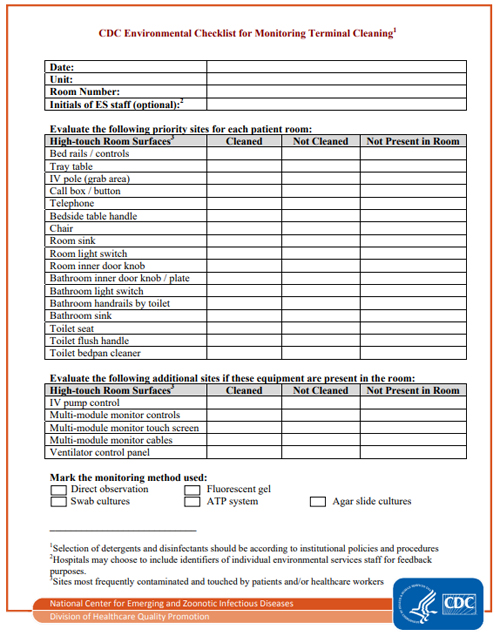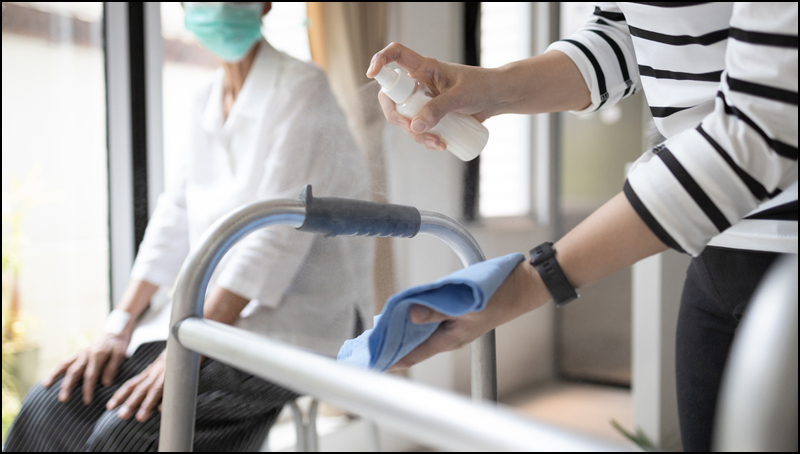Creating a Thorough Cleaning Checklist for Your Nursing Home
Sarah woke up coughing, her throat sore and her nose stuffed up. "I must be coming down with a cold," she thought. But when she mentioned it to the nurse, alarm bells went off.
Within days, Sarah's "cold" had spread to over a dozen residents in the nursing home where she lived. This dangerous respiratory infection spread so quickly because of lax cleaning protocols.
According to the CDC, over 1.6 million nursing home residents acquire health care-associated infections each year. A detailed cleaning checklist is crucial to stop the spread of infections in nursing homes and keep vulnerable residents healthy.

Areas to Include in a Nursing Home Cleaning Checklist
Resident Rooms
Bed rails, call buttons, and remotes harbor lots of germs through frequent handling. A 2017 study found MRSA on over 50% of bed handrails tested in a long-term care facility. Nurses' stations and medication carts are other high touch surfaces needing cleaning.
Common Areas
High traffic areas like dining rooms, lounges, and hallways need regular cleaning. A 2020 study found coronavirus present on 25% of common area surfaces tested in a nursing home with an outbreak.
Kitchen and Laundry Facilities
These areas need rigorous cleaning protocols, as infections can spread through food and linens. A CDC report found improper food handling caused over half of norovirus outbreaks in long-term care facilities.
Cleaning Frequency for Each Area
High touch surfaces like doorknobs, light switches, call buttons, and handrails should be disinfected at least once daily and even more frequently in common areas.
Bathrooms harboring lots of germs require thorough daily cleaning. The CDC recommends bathrooms also be deep cleaned weekly, including disinfecting surfaces like shower chairs, sinks, and toilets.
Shared resident equipment like wheelchairs, walkers, lift slings, and therapy items should be disinfected at least weekly. Cleaning should also occur after each individual use.
Kitchen and laundry facilities should have daily cleaning schedules. Kitchen surfaces like counters, appliances, and eating utensils need daily disinfecting. Laundry facilities also need thorough cleaning to avoid spreading pathogens through linens.
In addition to regular cleaning, the CDC recommends performing periodic deep cleaning on areas like carpets, window treatments, air vents, and upholstered furniture which can harbor germs. A rigorous cleaning schedule is key to infection control.
The CDC recommends cleaning shared equipment at least weekly and between each patient use.

Disinfectants and Sanitizing Solutions to Use
Use EPA-approved hospital grade disinfectants that are proven effective against pathogens like MRSA, coronavirus, norovirus, C. difficile, and more. These disinfectants are stronger than everyday cleaning products.
Bleach solutions can be effective disinfectants, but they must be diluted properly. The CDC says diluting bleach 1:10 or 1:100 with water depending on the application. At higher concentrations, bleach solutions are caustic and can be corrosive to surfaces. Pre-mixed bleach solutions lose potency over time, so they must be refreshed daily.
Staff should never mix cleaning products together. Bleach mixed with acidic products like vinegar or ammonia can create dangerous chlorine gas. Ammonia mixed with rubbing alcohol creates a fire hazard. Reading labels carefully and only using one disinfectant at a time reduces these risks. Consult the EPA's list of approved disinfectants and follow manufacturer dilution instructions closely.
Special Safety Measures for Cleaning Staff
Cleaning staff should wear proper personal protective equipment (PPE) like gloves, masks, goggles, and gowns when handling disinfectants and cleaning bodily fluids. Gloves should be changed after each room or task to avoid spreading germs.
All chemical bottles should be clearly labeled with the product name, dilution instructions, hazards, and expiration date. Disinfectants should be stored in a locked closet or cabinet separate from residents to avoid accidental ingestion.
Spray bottles should be labeled as to their contents and concentration. Having a facility map indicating locations of safety gear like eyewash stations can help in case of chemical splashes.
Any spills, chemical exposures, or other accidents on the job should be reported to a supervisor immediately. Seeking prompt medical attention for chemical burns or ingestion can prevent serious injury. Regular training ensures staff know how to use PPE and cleaning products safely.
The Benefits of Outsourcing Nursing Home Cleaning
Professional medical cleaning services have the necessary training and qualifications to maintain a nursing home. You can train in-house employees in these techniques, but it is a lengthy, ongoing process due to new discoveries and innovations and staff turnover. You must make sure they are consistent in their cleaning methods, and correctly handle the disposal of biohazards like blood and sharps.
You must also consider the cost of the employees, both their salary and benefits, as well as the cost of cleaning supplies and equipment. In addition, you must account for time off for illness or vacation, and workers' compensation insurance in the event of accident or injury.
In contrast, a commercial cleaning company specializing in healthcare facilities deals with all of the costs, training, and personnel issues associated with a janitorial or housekeeping crew. In the meantime, you get to focus your attention on managing your facility and caregivers.
Finding a Commercial Nursing Home Cleaner
Outsourcing this work makes both fiscal and hygienic sense, so long as you choose a company specializing in healthcare facilities. Request a free quote today to learn more.
Get Bids From Nursing Home Cleaners
Use our free request for quote tool and get price quotes from multiple nursing home cleaners in your area. There are no obligations to hire and we won't ask for your credit card information.


